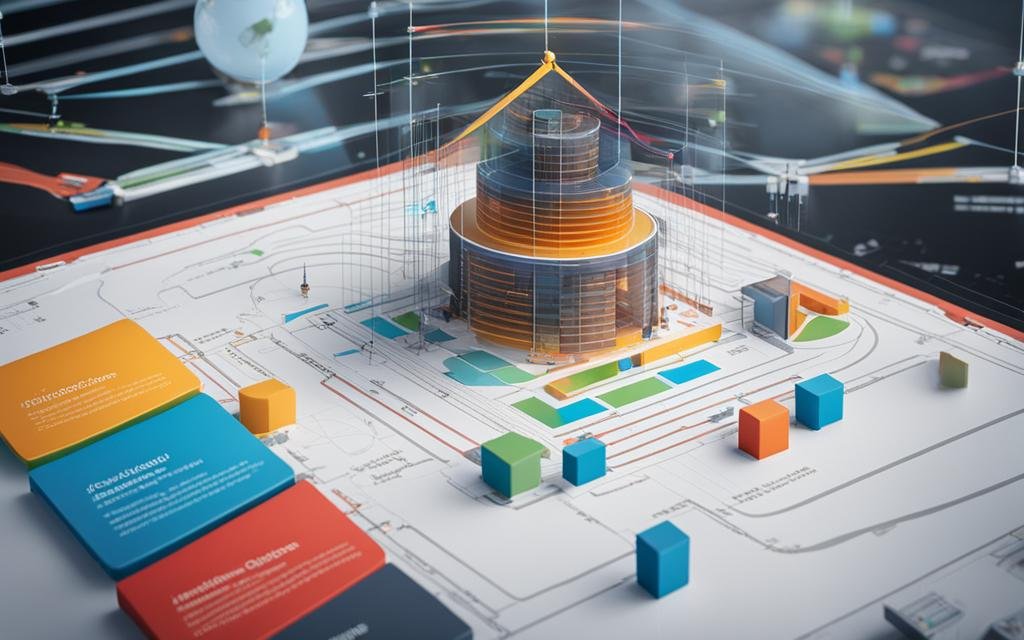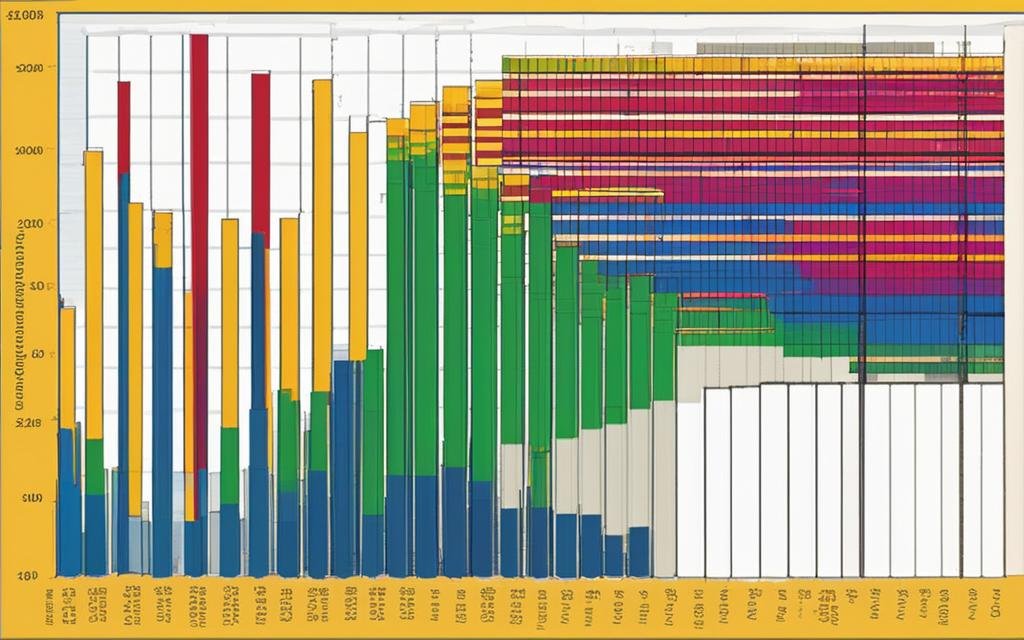Are you passionate about technology and innovation? Do you have a knack for designing and implementing IT systems? If so, a career as a technical architect might be the perfect fit for you. As a technical architect, you’ll have the opportunity to drive innovation, develop cutting-edge tech strategies, and play a dynamic role in shaping the future of technology.
Key Takeaways:
- Technical architects specialize in designing and implementing IT systems.
- They work closely with enterprise architects and solution architects.
- Technical architects drive innovation and develop tech strategies.
- They have a dynamic role in ensuring the usability and functionality of technology.
- A career as a technical architect offers promising opportunities for growth and advancement.
What is a Technical Architect?
A technical architect is a specialized IT position responsible for the design and implementation of IT systems within an enterprise. They work closely with enterprise architects and other IT roles to ensure the usability and functionality of the technology. Technical architects have in-depth proficiency in one area of technology and often have specialized titles based on their expertise, such as Java, Python, or SAP technical architect.
As experts in their field, technical architects design the structure of new technology systems, oversee the implementation of programs, and provide technical blueprints for IT solutions. They play a crucial role in analyzing single applications and managing teams of developers and IT specialists. With their deep knowledge and hands-on approach, technical architects are key in driving innovation and ensuring the success of IT projects.
In the dynamic role of a technical architect, individuals must possess a strong understanding of IT systems, design principles, and implementation processes. They work collaboratively with stakeholders to identify business needs and align technology solutions accordingly. By leveraging their expertise and staying up-to-date with the latest advancements in their chosen technology, technical architects contribute to the efficient and effective functioning of IT systems within an enterprise.
A technical architect’s role is crucial in the design and implementation of IT systems within an enterprise. Their in-depth proficiency in one area of technology, coupled with their hands-on approach, allows them to drive innovation and ensure the usability and functionality of technology. With their expertise, technical architects play a critical role in the success of IT projects and contribute to the efficient functioning of IT systems within an organization.
Roles and Responsibilities of a Technical Architect
A technical architect plays a crucial role in IT projects by providing expertise in designing and implementing innovative IT solutions. Their responsibilities encompass a wide range of tasks, from creating technical blueprints to managing project teams and ensuring the success of technology initiatives. Let’s explore the key roles and responsibilities of a technical architect in more detail.
Roles
- Designing IT Systems: Technical architects collaborate with enterprise architects and solution architects to design and develop robust and scalable IT systems. They analyze requirements, propose technical solutions, and create architectural designs that align with business objectives.
- Managing Project Teams: Technical architects oversee teams of developers and IT specialists, providing guidance and technical expertise throughout the project lifecycle. They assign tasks, monitor progress, and ensure that deliverables meet quality standards and project timelines.
- Ensuring Usability and Functionality: Technical architects are responsible for ensuring that IT systems are user-friendly, reliable, and perform optimally. They conduct testing, troubleshoot issues, and optimize system performance to deliver high-quality solutions.
Responsibilities
- Producing Documents and Diagrams: Technical architects document the system design and architecture, creating detailed diagrams and documents that serve as blueprints for development and implementation.
- Informing Stakeholders: Technical architects communicate with stakeholders and provide updates on project progress, potential risks, and technology recommendations. They bridge the gap between technical complexities and business requirements, ensuring alignment and understanding.
- Managing IT Experts: Technical architects lead and manage teams of IT experts, fostering collaboration, and ensuring efficient resource allocation. They mentor team members, provide guidance, and facilitate knowledge-sharing to promote professional growth and development.
In summary, a technical architect brings technical expertise and leadership to IT projects, playing a vital role in designing and implementing innovative IT solutions. Their roles and responsibilities encompass system design, project management, team leadership, and stakeholder communication. By leveraging their skills, technical architects drive the successful execution of IT projects, contributing to the overall success of organizations in today’s digital landscape.

Skills and Qualifications of a Technical Architect
Being a successful technical architect requires a combination of hard and soft skills. Hard skills are technical competencies that are essential for performing the job, while soft skills are personal qualities that contribute to effective communication and collaboration. Here are some of the key skills and qualifications needed to excel as a technical architect:
Hard Skills
- Strong technical expertise in IT systems and architecture design
- Proven work experience in system architecture or project management
- In-depth knowledge of strategic IT solutions
- Hands-on experience in software development and programming languages
- Familiarity with different operating systems and development platforms
Soft Skills
- Effective problem-solving abilities
- Excellent communication and interpersonal skills
- Ability to work well in a team and collaborate with diverse stakeholders
- Strong leadership and decision-making capabilities
- Flexibility and adaptability in a fast-paced, dynamic environment
Having a combination of these hard and soft skills is crucial for technical architects to successfully navigate the complexities of their role and drive innovation within their organizations. The ability to balance technical expertise with effective communication and collaboration is essential for delivering high-quality solutions and driving business growth.

Table: Comparison of Hard and Soft Skills for Technical Architects
| Hard Skills | Soft Skills |
|---|---|
| Technical expertise in IT systems | Problem-solving abilities |
| System architecture and project management | Communication and interpersonal skills |
| Knowledge of strategic IT solutions | Ability to work well in a team |
| Software development and programming | Leadership and decision-making capabilities |
| Familiarity with operating systems and platforms | Flexibility and adaptability |
By combining these hard and soft skills, technical architects can effectively design and implement IT systems, collaborate with teams, and drive innovation within their organizations. These skills are crucial for success in a dynamic and ever-evolving field like technical architecture.
Becoming a Technical Architect
Becoming a technical architect requires a combination of education, experience, qualifications, and certifications. Here is a step-by-step guide to help you navigate the career path:
- Earn a degree: Start by obtaining a bachelor’s or postgraduate degree in IT, computer science, or a related field. This foundational knowledge will provide you with a strong base to build upon.
- Gain work experience: Gain practical experience by working in roles such as system manager, project manager, or software developer. This hands-on experience will allow you to understand the intricacies of IT systems and the challenges they present.
- Obtain certifications: Certifications can enhance your skills and demonstrate your proficiency in specific programming languages, IT systems, and methodologies. Consider obtaining certifications such as The Open Group Architectural Framework (TOGAF), SCRUM Master, and BCS Foundation Certificate in Enterprise and Solutions Architecture.
- Develop leadership skills: Transition into leadership roles to gain experience in managing teams and projects. Developing strong leadership and management skills will help you advance in your career as a technical architect.
By following these steps, you can pave your way towards a successful career as a technical architect.
Table: Certifications for Technical Architects
| Certification | Description |
|---|---|
| The Open Group Architectural Framework (TOGAF) | A globally recognized certification that demonstrates proficiency in enterprise architecture and methodology. |
| SCRUM Master | A certification that showcases expertise in agile development methodologies and project management. |
| BCS Foundation Certificate in Enterprise and Solutions Architecture | An industry-recognized certification that validates knowledge and understanding of enterprise and solutions architecture. |
These certifications, along with your qualifications and experience, will help you stand out in the field and open doors to exciting opportunities as a technical architect.

Responsibilities and Deliverables of a Technical Architect
A technical architect plays a vital role in the design and implementation of IT systems. They have a wide range of responsibilities and deliverables that contribute to the success of projects. Some of the key responsibilities of a technical architect include:
- Collaborating with stakeholders to understand the company’s needs and requirements
- Assessing the current system to determine if an upgrade or new system is required
- Providing IT design ideas and creating architecture diagrams
- Managing the design and implementation of the system
- Troubleshooting any issues that arise during the implementation process
- Measuring the performance of the system to ensure it meets the desired outcomes
- Providing training and feedback to users and stakeholders
In addition to these responsibilities, a technical architect is also responsible for producing architecture diagrams that illustrate the structure and components of the IT system. These diagrams help stakeholders visualize how the system will be implemented and ensure a common understanding among the project team.
Furthermore, technical architects are involved in the development of applications that support the IT system. They work closely with developers to ensure that the software is designed and built according to the defined technical specifications. They also provide post-installation feedback to address any issues or improvements that may arise after the system is deployed.
“A technical architect is the bridge between the business needs and the technical requirements of a project. They are responsible for ensuring that the IT system aligns with the organization’s goals and objectives while meeting the technical standards and best practices.”
The Architecture Diagram:

| Deliverables | Description |
|---|---|
| Architecture Diagram | A visual representation of the system’s structure and components. |
| Technical Design Documents | Detailed documents outlining the technical specifications and requirements of the system. |
| Application Prototypes | Functional prototypes of the applications that will be developed for the system. |
| Test Plans | Documents outlining the testing strategy and approach for the system. |
The deliverables of a technical architect vary depending on the project and organization. However, these are some common deliverables that technical architects are responsible for producing throughout the project lifecycle.
Salary of a Technical Architect
When considering a career as a technical architect, understanding the salary expectations is an important factor. The average annual salary for a technical architect can range from $79,000 to $161,000, depending on factors such as experience and career level. In the United States, the average salary for a technical architect is $119,352.
Salary expectations can vary based on several factors. Experience plays a significant role in determining salary, with more experienced technical architects often earning higher salaries. Career level is another factor that influences salary, as those in senior positions may command higher compensation. Additionally, certifications and qualifications can increase earning potential.
It is important to note that salary ranges can vary depending on the industry, location, and employer. Technical architects working in industries such as finance or healthcare may have higher salary ranges compared to those in other sectors. Furthermore, major metropolitan areas tend to offer higher salaries to account for the higher cost of living.
Overall, a career as a technical architect can offer competitive salaries and the potential for growth, especially for individuals with experience, qualifications, and expertise in the field.

Technical Architect Career Path
For individuals passionate about technology and looking for a rewarding career path, becoming a technical architect can be an excellent choice. Technical architects play a crucial role in designing and implementing IT systems, ensuring their functionality, and managing teams of developers and IT specialists. If you’re interested in pursuing this dynamic role, there are several paths you can take to reach your career goals.
Starting in Systems Development or Software Engineering
Many technical architects begin their careers in areas such as systems development or software engineering. These roles provide hands-on experience working with various technologies and developing a deep understanding of how different systems and applications function. By gaining expertise in systems development or software engineering, individuals can acquire the necessary technical knowledge and skills to excel as a technical architect.
Transitioning into Leadership Positions
As individuals progress in their careers and gain experience in technical roles, they have the opportunity to transition into leadership positions. By taking on roles such as project managers or system managers, individuals can develop essential skills in team management, project planning, and strategic decision-making. These skills are crucial for technical architects, as they often lead teams of developers and IT specialists and make critical decisions about IT system design and implementation.
Advancing to Senior Architecture Positions
As technical architects gain more experience and expertise in their field, they can advance to senior architecture positions within organizations. Senior technical architects, also known as solution architects or enterprise architects, take on more significant responsibilities and have a broader scope of influence. In these positions, technical architects work on complex projects, develop enterprise-wide IT strategies, and collaborate with other business units to drive innovation and align technology with organizational goals.
Certifications for a Technical Architect
Obtaining relevant certifications is crucial for technical architects to demonstrate their expertise and enhance their career prospects. The following certifications are highly valued in the field:
1. The Open Group Architectural Framework (TOGAF)
TOGAF is a widely recognized certification that focuses on enterprise architecture standards and methodologies. It provides technical architects with a comprehensive set of tools and resources for designing and implementing effective IT systems. TOGAF certification demonstrates proficiency in creating architecture frameworks and aligning technology strategies with business goals.
2. SCRUM Master Certification
SCRUM is an agile project management framework widely used in software development. Technical architects with SCRUM Master certification possess valuable skills in facilitating collaboration, managing project timelines, and ensuring the successful delivery of IT solutions. This certification showcases the ability to lead cross-functional teams and drive efficient project execution.
3. BCS Foundation Certificate in Enterprise and Solutions Architecture
The BCS Foundation Certificate in Enterprise and Solutions Architecture provides technical architects with a solid foundation in key architectural concepts and principles. This certification validates knowledge in designing scalable and adaptable IT solutions that align with business objectives. It emphasizes the ability to analyze complex systems and make informed architectural decisions.
By acquiring these certifications, technical architects can demonstrate their proficiency in relevant areas and stand out in a competitive job market. These certifications not only validate their skills but also provide them with the necessary knowledge to excel in their roles as technical architects.
Tools for Technical Architects
Technical architects rely on a variety of tools to effectively manage and execute their projects within IT systems and enterprise architecture. These tools streamline processes, enhance collaboration, and ensure the successful implementation of technology solutions. Here are some essential tools that technical architects utilize:
Architecture Design Software
Architecture design software is an indispensable tool for technical architects as it allows them to create detailed blueprints and diagrams of the proposed IT systems. These software solutions enable technical architects to visualize the structure, components, and dependencies of the system, providing a clear roadmap for the development and implementation stages.
Development Platforms
Technical architects rely on development platforms to create and test applications and software components. These platforms offer a range of tools and frameworks that facilitate efficient coding, debugging, and version control. By leveraging development platforms, technical architects can ensure the quality, reliability, and compatibility of their applications.
Project Management Tools
Effective project management is crucial for technical architects to successfully deliver IT projects on time and within budget. Project management tools enable technical architects to plan, schedule, and track project activities, allocate resources, and collaborate with team members. These tools provide a centralized platform for managing tasks, timelines, and milestones, ensuring efficient project execution.
Cloud Computing Technologies
Cloud computing technologies have revolutionized the way technical architects design and deploy IT systems. Cloud platforms offer scalability, flexibility, and cost-efficiency, allowing technical architects to leverage infrastructure-as-a-service (IaaS), platform-as-a-service (PaaS), and software-as-a-service (SaaS) solutions. Cloud technologies enable technical architects to architect scalable and resilient systems that can handle dynamic workloads and adapt to changing business requirements.
Overall, the use of these tools empowers technical architects to effectively plan, design, and implement IT systems, ensuring the successful execution of projects and the achievement of business objectives.
Also Read : Understanding What Is A Technical School: Your Guide
Conclusion
A career as a technical architect offers exciting opportunities in the tech industry. Technical architects play a vital role in designing and implementing IT systems, managing teams of developers and IT specialists, and ensuring the usability and functionality of technology. With the demand for technical architects on the rise, this dynamic role offers a promising future filled with innovation and growth.
As businesses continue to rely heavily on technology, the need for skilled technical architects will only increase. By staying at the forefront of emerging technologies and becoming experts in their chosen areas, technical architects can drive innovation and shape the future of IT systems. As the tech industry continues to evolve, technical architects will be at the forefront of developing and implementing cutting-edge solutions to meet the ever-growing needs of businesses and organizations.
With their unique combination of technical expertise and project management skills, technical architects are well-positioned for growth and advancement within their careers. They have the opportunity to progress to senior architecture positions, such as solution architects or enterprise architects, or use their skills to become highly sought-after IT consultants. The career path of a technical architect is not only rewarding, but also offers the potential for higher salaries and increased professional opportunities.
So, if you’re looking for a career that allows you to be at the forefront of technology, drive innovation, and shape the future of the tech industry, becoming a technical architect may be the perfect path for you. With the demand for skilled professionals in this field continuing to grow, now is the time to unlock your future and embark on an exciting journey as a technical architect.
FAQ
Q: What is a technical architect role?
A: A technical architect is responsible for designing and building the technical solution for a project or system. They work closely with stakeholders, designers, and developers to ensure that the technical architecture meets the business requirements and is scalable and resilient.
Q: What are the main responsibilities of a technical architect?
A: The main responsibilities of a technical architect include designing and implementing technical solutions, providing technical guidance and leadership, reviewing and approving technical designs, ensuring adherence to standards and best practices, and collaborating with stakeholders to understand and address technical requirements.
Q: How does a technical architect differ from a solution architect?
A: While both roles involve designing technical solutions, a solution architect typically focuses on designing solutions for specific business problems or opportunities, while a technical architect focuses on the technical aspects of the design and implementation of the solution.
Q: What skills are important for a successful technical architect?
A: A successful technical architect should have excellent communication skills, a strong understanding of ITIL and other best practices, managerial and technical expertise, the ability to work under deadline pressure, and the capability to lead and collaborate with technical teams.
Q: What qualifications or experience are necessary to become a technical architect?
A: While there is no specific educational requirement for a technical architect role, many employers look for candidates with a degree or postgraduate qualification in a relevant field, as well as several years of experience in a technical role with managerial responsibilities.
Q: How can someone start a career as a technical architect?
A: To start a career as a technical architect, individuals should consider taking on roles that involve a mix of technical and managerial responsibilities, focus on professional development, and aim to gain the necessary skills and experience to progress in the technical architect domain.
Q: What are the typical career progression options for a technical architect?
A: Career progression for a technical architect may involve taking on more senior technical architect roles, transitioning into roles such as cloud architect or enterprise architect, or moving into managerial positions that involve overseeing technical teams and projects.
Q: Where can one find job opportunities for a technical architect role?
A: Job opportunities for a technical architect role can be found through online job boards, professional networking platforms, and by directly checking job adverts from companies seeking technical architects or related job titles such as systems architect or IT architect.
Q: What are the key challenges faced by a technical architect in their role?
A: Some key challenges faced by a technical architect include managing technical and managerial resources, meeting deadlines for technical projects, addressing technical issues and tasks, and providing an overview of the technical work and IT architecture within a project or system.
Q: What are the career options for someone with experience as a technical architect?
A: Someone with experience as a technical architect may explore career options such as transitioning into roles that fall under the broader category of enterprise architect or cloud architect, or moving into management positions that involve overseeing technical teams and technical projects.
Source Links
- https://www.leanix.net/en/wiki/ea/technical-architect
- https://www.linkedin.com/pulse/unlock-your-future-aws-solutions-architect-career-course-executive
- https://www2.deloitte.com/us/en/pages/careers/articles/careers-blog-next-gen-architecture-program-gary-arora.html

